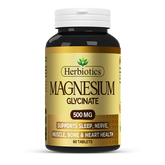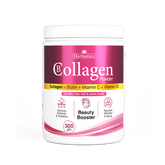Magnesium Rich Foods and Vegetables: Natural Source
Magnesium is an essential element that helps the human body work optimally. Magnesium is found in every cell of the body and is necessary for energy generation, bone health, neuron and muscle function, and blood pressure regulation. Despite its importance, magnesium insufficiency is a global concern.

This article discusses the greatest natural sources of magnesium, why it's important, and when you should consider taking a magnesium supplement to meet your body's needs. Understanding magnesium-rich foods and their advantages allows you to make educated decisions that will naturally support your health.
Why Magnesium Is Vital for Your Body
Magnesium participates in about 300 enzymatic processes in the body. It serves as a cofactor for a variety of activities, including protein and DNA synthesis, blood sugar regulation, and muscle contraction control. Without enough magnesium, these processes might fail, resulting in weariness, muscular cramps, high blood pressure, and even osteoporosis.
The daily required magnesium intake might vary:
-
Adult men: 400–420 mg
-
Adult women: 310–320 mg
-
Pregnant women: 350–360 mg
However, modern diets, stress, and certain medical problems frequently result in deficiencies. Recognizing the importance of magnesium-rich foods in your diet is a critical step toward improved health.
Magnesium-Rich Foods: A Closer Look at Nature’s Sources
A balanced diet high in whole, unprocessed foods is the best approach to guarantee you get enough magnesium. The following are some of the most magnesium-rich foods to integrate into your diet.
1. Leafy Green Vegetables
Leafy greens are among the most nutritious vegetables on the world, and they are high in magnesium.
-
Spinach: A single cooked cup contains around 157 mg of magnesium. Spinach is high in iron, calcium, and antioxidants, making it a superfood.
-
Swiss Chard: This colorful vegetable includes around 150 mg of magnesium per cooked cup, as well as vitamins A and C.
-
Kale: Although kale is not as high in magnesium as spinach or chard, it still gives a healthy dosage of roughly 30 mg per uncooked cup.
These greens are flexible and may be included into smoothies, salads, soups, and side dishes.
2. Nuts and Seeds
Nuts and seeds are concentrated sources of minerals, including magnesium.
-
Almonds: A handful (28 grams) includes around 76 mg of magnesium, as well as healthful fats and vitamin E.
-
Pumpkin Seeds: These seeds contain about 150 mg of magnesium per ounce, making them one of the most magnesium-rich snacks available.
-
Chia Seeds: Two tablespoons of chia seeds provide 95 mg of magnesium and are high in fiber and omega-3 fatty acids.
Including nuts and seeds in your breakfast or munching on them throughout the day will greatly increase your magnesium levels.
3. Whole Grains
Whole grains are mainstays in many diets and contain considerable amounts of magnesium, as well as other critical minerals.
-
Quinoa: A gluten-free grain, quinoa contains around 118 mg of magnesium per cooked cup.
-
Brown Rice: A cup of cooked brown rice includes around 86 mg of magnesium, as well as complex carbs for sustained energy.
-
Oats: A cup of cooked oats contains around 57 milligrams of magnesium.
-
Whole grains also promote heart health, digestion, and weight management.
4. Legumes
Legumes are nutrient-dense and adaptable, providing magnesium along with protein and fiber.
-
Black Beans: A cooked cup contains 120 mg of magnesium. They're perfect for soups, salads, and side dishes.
-
Lentils: A cup of lentils offers around 71 mg of magnesium and a generous serving of plant-based protein.
-
Chickpeas: These legumes provide 79 mg of magnesium per cup, making them ideal for hummus or roasted appetizers.
Legumes are an inexpensive method to achieve your magnesium requirements while providing diversity to your diet.
5. Fruits
Fruits may not contain as much magnesium as other foods, but they do add to your daily requirement.
Bananas: A medium banana provides around 32 mg of magnesium and is a rapid energy booster.
Avocados: A medium avocado contains around 58 mg of magnesium, in addition to healthful fats and potassium.
Figs: Dried figs are particularly high in magnesium, containing around 50 mg per 100 grams.
These fruits are versatile and may be added to smoothies, salads, or eaten alone.
6. Fatty Fish
Certain varieties of fish contain both omega-3 fatty acids and magnesium.
-
Salmon: A 3-ounce serving contains approximately 26 milligrams of magnesium.
-
Mackerel: This nutrient-dense seafood has 82 mg of magnesium per 3-ounce meal.
Fatty fish are great for heart health, brain function, and inflammation reduction.
7. Dairy Products
Dairy items such as milk and yogurt can also help you get more magnesium.
-
Milk: One glass of milk can contain up to 24 milligrams of magnesium.
-
Yogurt: One cup of plain yogurt contains around 50 mg of magnesium, depending on the brand.
These foods are adaptable and may be served as meals or snacks.
Health Benefits of Magnesium-Rich Foods
Magnesium-rich meals improve your health in numerous ways:
-
Bone Health: Magnesium improves calcium absorption and enhances bone formation.
-
Energy Production: It aids in the conversion of food into energy, which reduces weariness and increases productivity.
-
Heart Health: Magnesium helps to control blood pressure, reduces the risk of heart disease, and stabilizes cardiac rhythms.
-
Mental Health: Magnesium can help reduce anxiety and improve sleep quality.
-
Muscular Function: It prevents and relieves muscular cramps, spasms, and soreness.
Herbiotics Magnesium Supplements: A Reliable Solution
When your diet falls short, Herbiotics Magnesium Supplements are an efficient and simple approach to achieve your magnesium requirements.
Why Choose Herbiotics Magnesium Supplements?
-
High Bioavailability: Formulated for optimum absorption.
-
Comprehensive Support: Increases energy, decreases weariness, and promotes general well-being.
-
Safe and Trustworthy: Free of dangerous ingredients and thoroughly tested for quality.
Herbiotic Magnesium Supplements are intended to help you maintain optimal health without the hassle of meal preparation.
Final Verdict
Magnesium is an essential component of optimal health, affecting everything from energy generation to bone function. While magnesium-rich foods such as leafy greens, nuts, seeds, whole grains, legumes, fruits, and seafood are natural sources, not everyone can regularly achieve their daily requirements.
A magnesium supplement, such as Herbiotics Magnesium Supplements, is a good way to bridge this nutritional gap. By combining these supplements with a healthy diet, you can guarantee that your body gets the magnesium it requires for a healthier, more active life.
Begin your road to greater health now by increasing magnesium consumption, whether via natural sources or trustworthy supplements.




